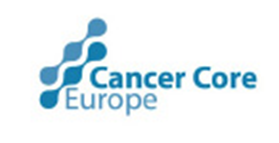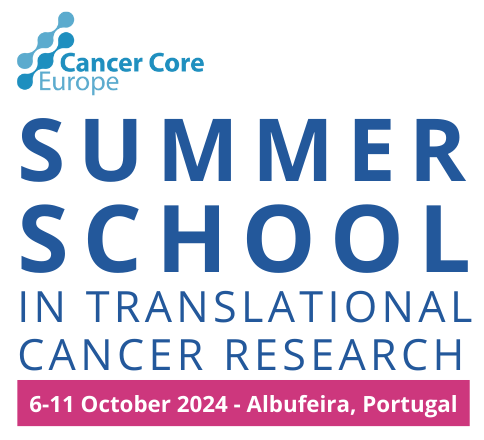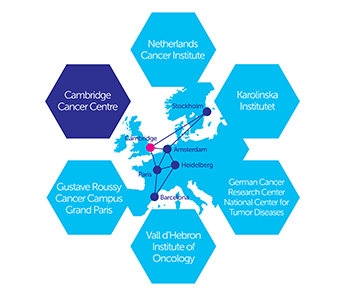Cancer Core Europe
Effective treatment of cancer remains one of the biggest medical challenges, due to the large diversity in mutations in individual patients. To tackle this problem, cancer research will need to be performed at a larger scale than is possible within single cancer institutes. Therefore, Gustave Roussy Cancer Campus Grand Paris, CRUK Cambridge Centre, Karolinska Institutet, Netherlands Cancer Institute (NKI), Vall d’Hebron Institute of Oncology (VHIO), German Cancer Research Center with the National Center for Tumor Diseases (DKFZ-NCT), and National Cancer Institute of Milan (INT) have created Cancer Core Europe as a working consortium.

Yearly within the Cancer Core Europe consortium around 60.000 newly diagnosed cancer patients are seen, 300.000 cancer treatments are delivered and about 1.000.000 outpatient visits are performed. More than 1500 clinical trials are being conducted at these seven cancer centres annually. Together with the strengths in basic and translational cancer research, this represents a unique critical mass of activity that when successfully harmonised in one operational clinical research structure will represent and harness a major force in European cancer research
To build the infrastructure of the consortium task forces have been established in each of the Centres in the domains of “e-hospital”, translational research platforms, harmonization of diagnostics, imaging, omics, biobanking, shared databases, and a virtual joint clinical trial infrastructure (i.e. joint sponsoring of clinical trials).
- Molecular Diagnostics
- Imaging
- Information technology and data sharing
- Clinical Trials
- Immuno-oncology
The goal of of the molecular diagnostics platform is to have a common set of diagnostic tests and platforms that can be carried out in each centre. This will facilitate the conduct of joint clinical trials and provide consistency between the centres. The specific goals include:
- Establishing a common panel of genes available in 6 centres
- Common pipelines for alignment, variant calling, and analysis
- Circulating information on molecularly defined clinical groups to decide on appropriate therapies
- Common controls ensure genomic data is high-quality and uniform
The cancer imaging working group is establishing a data repository for data sharing and developing standards that can be used for monitoring patient responses. Specific goals include:
- Incorporate clinical imaging into a data sharing platform
- Develop predictive modeling for responses to immuno-oncology agents
- Identify standards for response that can be harmonised across the network
The clinical trial working group has the broad goal of developing innovative trials for looking at personalised approaches to treat cancer and for identifying opportunities for working with investigators within the Centre's and with pharmaceutical companies collaborative clinical trials. The specific goals of the working group are:
- Evaluate whether matching treatment to molecular abnormalities induces antitumor activity
- Profiling patients according to molecular signatures and pathway alterations
- Evaluate tumor heterogeneity, sensitivity, and resistance
- Basket trials
- Follow up of patients using biopsies and cfDNA
- Innovative statistical designs
Sharing data across the consortium is an important goal and will be critical to the long term sustainability of the Consortium. The overall goals of this working group will be achieved through a combination of pilot projects and funding through European Initiatives.
- Create platform allowing the exchange of data (genomic, imaging, clinical, treatment outcomes) across centers
- Use common standards to ensure data interoperability
- Implement mandatory metadata directory
- First step will incorporate diseases where using the data for discovery-based research has potential to make an impact
Cancer Core Europe was established on July 4 2014 when the consortium agreement of Cancer Core Europe was signed in Paris by all members representing their Institutions.
- Alexander Eggermont - Gustave Roussy Cancer Campus Grand Paris
- Carlos Caldas - CRUK Cambridge Centre
- Ulrik Ringborg - Karolinska Institutet
- René Medema - Netherlands Cancer Institute
- Josep Tabernero - Vall D'Hebron Institute of Oncology
- Otmar Wiestler - German Cancer Research Center DKFZ-NCT
- National Cancer Institute of Milan (INT) - joined the consortium in 2017
- EIT Health on Innovation for Personalised Medicine (I4PCM)
- Transcan - Heterogeneity in Breast and Ovarian Cancers
- ANR - Support of Educational programmes

We are pleased to announce that applications are now being accepted for the Cancer Core Europe (CCE) Summer School in Translational Cancer Research, taking place in beautiful Algarve, Portugal from 6 – 11 October.
The CCE Summer School in Translational Cancer Research is intended to provide an in-depth training for early career scientists and clinicians to gain a cross-disciplinary knowledge of areas of the entire cancer research continuum, with a special focus on personalised cancer medicine. During this one-week course, we will offer workshops and talks by renowned speakers and facilitate the interaction between participants as well as speakers, coming from both preclinical laboratories and clinical centres worldwide. Participants have the opportunity to present their research projects and data in oral or poster presentations. For more information visit the Summer School webpage.
All applicants are required to submit an abstract and those accepted will have the opportunity to present their research projects and data in oral or poster presentations.
Internal application process
The CRUK Cambridge Centre is pleased to be able to fully fund four places (two clinical and two non-clinical) on the course this year. This will include registration fees, accommodation and travel. If you would like to apply for a funded Centre delegate place on this course please send your abstract, CV and a brief statement explaining how attendance would support your career goals to Kate Donoghue, Cambridge CCE Programme Manager. These applications will be reviewed and four individuals awarded the funded places. The deadline to submit your abstract, CV and statement is Friday 10 May. Successful applicants will be notified by Friday 17 May.
One further place will be reserved for a Cambridge delegate but you would need to secure your own funding. We will contact the highest scoring reserve(s) to discuss.
Please note, even if you are applying for a funded place you will still need to complete the registration process on the CCE summer school website and we will contact the organising committee to let them you have been awarded a delegate place from our Centre, which will guarantee your spot.
External/open application process
The closing date for the open application round is Friday 31 May.
If you have any questions regarding the application process, or general information please email Kate Donoghue.



















